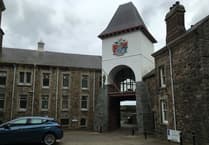Gwynedd residents are set to be hit with a 9.54 per cent rise in council tax to plug a £98m budget gap as Cabinet members consider a final report on the county’s draft budget for 2024/25.
A report to be put before members on Tuesday, outlines a recommended rise in council tax of 9.54 per cent, a figure which would bring an extra £8m into Cyngor Gwynedd’s coffers compared to last year.
It comes against a backdrop of a two per cent uplift in Welsh Government funding – well below the Wales average.
The report said that setting the council tax level “is a key decision for Full Council members to make” at a meeting scheduled for 7 March.
“The key to this is achieving an appropriate balance between the need to spend on services for the most vulnerable in our society, and the tax increase that is suitable to be levied on the residents of Gwynedd,” the report said.
“This year, it is recommended that the tax be raised by 9.54 per cent for 2024/25.
“That would generate £98m of tax (compared to £90m in 2023/24).
“That would equate to a Council Tax increase of £152.89 for a Band D property, or £2.94 a week.”
The report said that “the proposal to raise the tax by 9.54 per cent is consistent with the situation across north Wales”, despite Gwynedd seeing an average rise of less than four per cent in the past eight years.
“The level that has had to be raised has varied annually, largely to reflect the gap that existed as a result of the Welsh Government grant settlement,” the report added.
“The choice between maintaining services and taxation remains a difficult one, of course, and it is up to all members to take stock and arrive at the balance that they consider appropriate.
“It is seen in this report that demand pressures on services, as well as inflationary pressures indicate that a combination of Council Tax increases and the introduction of a new programme of savings and cuts must be considered if a balanced budget is to be set for 2024/25.
“If Council members wanted a less than 9.54 per cent increase in the level of tax, then fewer permanent resources would have to be committed to deal with the pressures on services, there would be a need to find further savings and cuts, or a combination of both.”
Council leader Dyfrig Siencyn said: “We have been warning the Government for a long time that a lack of money year on year is putting services for local people at risk.
“I’m gravely concerned that things have reached a tipping point and we no longer have an option but to cut services and increase council tax.
“For years, we have been making every effort to shield the most vulnerable in society from the negative impact of the shrinking budgets we receive from the Government.
“Despite the dire financial situation we find ourselves in again this year, we are determined to continue to protect essential services, such as those for vulnerable children and education.”
The final council tax rise will be decided upon by full council at a meeting on 7 March.





Comments
This article has no comments yet. Be the first to leave a comment.